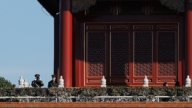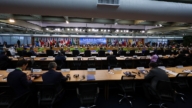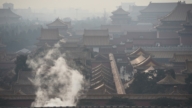【新唐人2013年04月02日讯】新加坡一研究机构,分析了中国283个中小城市的市长和市委书记,从他们10年的政绩和升迁结果发现,中国的所谓“绿色官员”升迁难。这份研究用量化的方式,再次佐证﹕中共官场追求GDP和表面政绩的问题。让我们也一起去关心这个问题。
新加坡国立大学房地产研究院院长邓永恒教授,3月30号公布一项研究结果,结果显示,在中国,如果城市的市委书记和市长任期内的GDP增速,比上一任提高0.3%的话,升职概率将高于8%,如果任期内,长期把钱花在民生和环保上面,那么,升官的概率是负的数值。
邓永恒建议,中国应该改变干部考核体制。
而中央民族大学哲学和宗教学系教授赵士林指出,中共任命官员和提拔官员的标准,是不择手段的追求所谓国内生产总值GDP。因此不管生态、且不顾一切代价。
中央民族大学哲学和宗教学系教授赵士林:“这个帐其实是非常简单非常好算的,你用一块钱的GDP发展,带来四元钱的环境污染,你说哪个合算?你发展了一元钱的GDP ,要四元钱来治理,非常简单的帐,难道算不过来吗?就反映了我们的急功近利,反映了我们的浮躁,反映了我们前几年的发展观有根本问题。”
赵士林又指出,中共官员给出的GDP数字很多时候是假的。他说,大陆每年各省统计的GDP数字,比中央统计的至少高出四、五千个亿,甚至有的时候高出三万个亿。
那么假政绩为什么如此猖獗?
赵士林说,因为官员这样做能迅速获得升迁,能使自己的政治前途获得保障。
而中国人民大学国际关系学院教授张鸣表示,这种单纯追求GDP数字的GDP主义,已经在中国存在很长时间。
中国人民大学国际关系学院教授张鸣:“花在民生上都属里子上的,比如菜篮子工程,福利,都是看不见的。看得见的都是什么修路,修桥啊,盖大楼啊就这样的事。中国有官场的形式主义,GDP主义两个结合一起算,就是这个结果。就是你要钱花在面上,就容易看得见,看得见就容易提升。关键是看它那个考核体系,关键是他们上级的这个,这种政绩价值观有问题。”
中共当局又为什么要采取这样一种饮鸩止渴的发展模式,和政绩标准呢?
赵士林指出,中共当局急功近利,只为确保自己执政的合法性和稳定性,因为短时期的发展能解决一些迫在眉睫的问题,比如贫困问题和基本生存问题。他认为,很多落后的发展中国家一开始难免碰到这个问题。
但是,赵士林认为,中国已经改革三十年了,民众已经付出沉重的代价,现在中国必须彻底改变。
张鸣则指出,如果中国民众的意见必须纳入官员的政绩考量,那么,官员的观念必然不同。张鸣说,中共政权不是来自民众的授权,才造成今天中共官场的表现。
今年年初以来,有毒的雾霾笼罩了北京和中国北方。据大陆官媒《中国广播网》报导,有经济学家调查发现,一个地方的环保投资占当地GDP的比例每升高0.36%,当地书记的升迁机会便会下降8.5%。这些经济学家认为,没有野心的官员才会关注环境,而有野心的官员则会通过修建新路和基础设施来提升GDP。
另外,山西省的一项调查显示,有71%的受访群众认为,那些只顾经济增长而不管环境污染的官员应该被解职。但91%的官员却认为,这种官员应该继续留用。
《中国新闻网》报导,全国政协委员,作家冯骥才在两会期间指出,多个城市出现的雾霾问题,恐怕跟现在官员的政绩观念有很大关系。冯骥才说,凡是能跟政绩挂上钩的,官员就关心,跟政绩无关的事情,官员往往就不关心,或者放在一边。
采访编辑/秦雪 后制/陈建铭
Chinese Communist Party officials Solely Pursue GDP
A research institution in Singapore did an analysis of mayors
and party secretaries from 283 small and medium-sized cities in China.
It showed that officials who respect the environment,
had difficulty getting a promotion.
This quantitative study once again proves that officials of
the Chinese Communist Party (CCP) only pursue GDP and surface achievements.
On March 30, Professor Deng Yongheng, the director of
the Real Estate Institute at the Singapore National University announced the results of a recent study.
The study shows that the possibility of an official in China
being promoted was over 8%, if the city’s GDP increased during his tenure.
If an official chose to spend money on people’s livelihood
and environmental protection, his promotion probability was reduced.
Professor Deng suggests that the appraisal system in China
should be changed.
Professor Zhao Shilin, from the philosophy and religious
department of the Central University for Nationalities, says
the CCP’s standard of promotion is based on an unscrupulous
pursuit of GDP at all costs, regardless of the ecology.
Zhao Shilin: “This is very easy to understand;
one dollar worth of GDP equals four dollars to combat its environmental pollution.
Can you figure that?—one dollar of gain in GDP
takes four dollars to clean up.
This reflects China’s seeking of quick success, impatience,
and the fundamental flaw of the concept of development in the past few years.”
Zhao Shilin also points out that the CCP’s GDP figures
are mostly fake.
Every year, GDP from all provinces are 4,500-billion yuan;
3,000-billion higher than the central government’s statistics.
Why are fake figures of accomplishment so rampant?
—because officials want to be promoted fast in order to
secure their political future.
Professor Zhang Ming, Renmin University of
China Institute of International Relations, says
this pursuit of GDP figures has been going on
in China for a long time.
Zhang Ming: “What you spend on people’s welfare
is invisible; but roads, bridges and skyscrapers are easy to see.
A combination of Chinese officialdom and GDP
will produce scenarios like this.
If you put money on things that are visible,
you get promoted—the key is the evaluation system.
The important thing is that those higher-up officials
have an achievement value problem.”
Why has the CCP chosen such a performance standard
equivalent to “drinking poison to quench ones thirst”?
Zhao Shilin says, CCP officials want to use quick success
to ensure the legitimacy and stability of their rule.
Short-term development can solve some pressing issues,
such as poverty and basic survival.
They believe that many developing countries
will run into this problem at the beginning.
However, Zhao Shilin says, China has had three decades
of reform and the public has already paid a heavy price;
he believes China must now undergo a complete change.
Zhang Ming points out that, if the Chinese people’s opinion
of officials were considered in their promotions,
the officials’views would be quite different.
But, the CCP’s authority has not come from the people,
so it leads to today’s performance of the CCP officialdom.
Since the beginning of this year, toxic smog
has enveloped Beijing and northern China.
Official media, China Broadcast Network reports that
from one economists’survey, of the local GDP ratio,
an increase of 0.36% in environmental protection investment
will decrease the secretary’s promotion probability by 8.5%.
Economists believe that, only officials with no ambition
will be concerned about the environment, otherwise,
they will just construct new roads and infrastructure
to enhance the GDP.
In addition, a survey in Shanxi Province shows
that 71% of respondents thought that
officials who are concerned only about economic growth
regardless of environmental pollution, should be removed.
Yet, 91% of the officials are shown to believe
that such officials should remain in their posts.
China News Net reported that during the CCP’s two sessions
writer Feng Jicai, also a member of the National Committee
of the Chinese People’s Political Consultative Conference,
pointed out that a smog problem in many cities might have
a lot to do with officials’ concept of political achievement.
Many officials care only about enhancing political achievements
and things that do not concern promotion will be set aside.




























